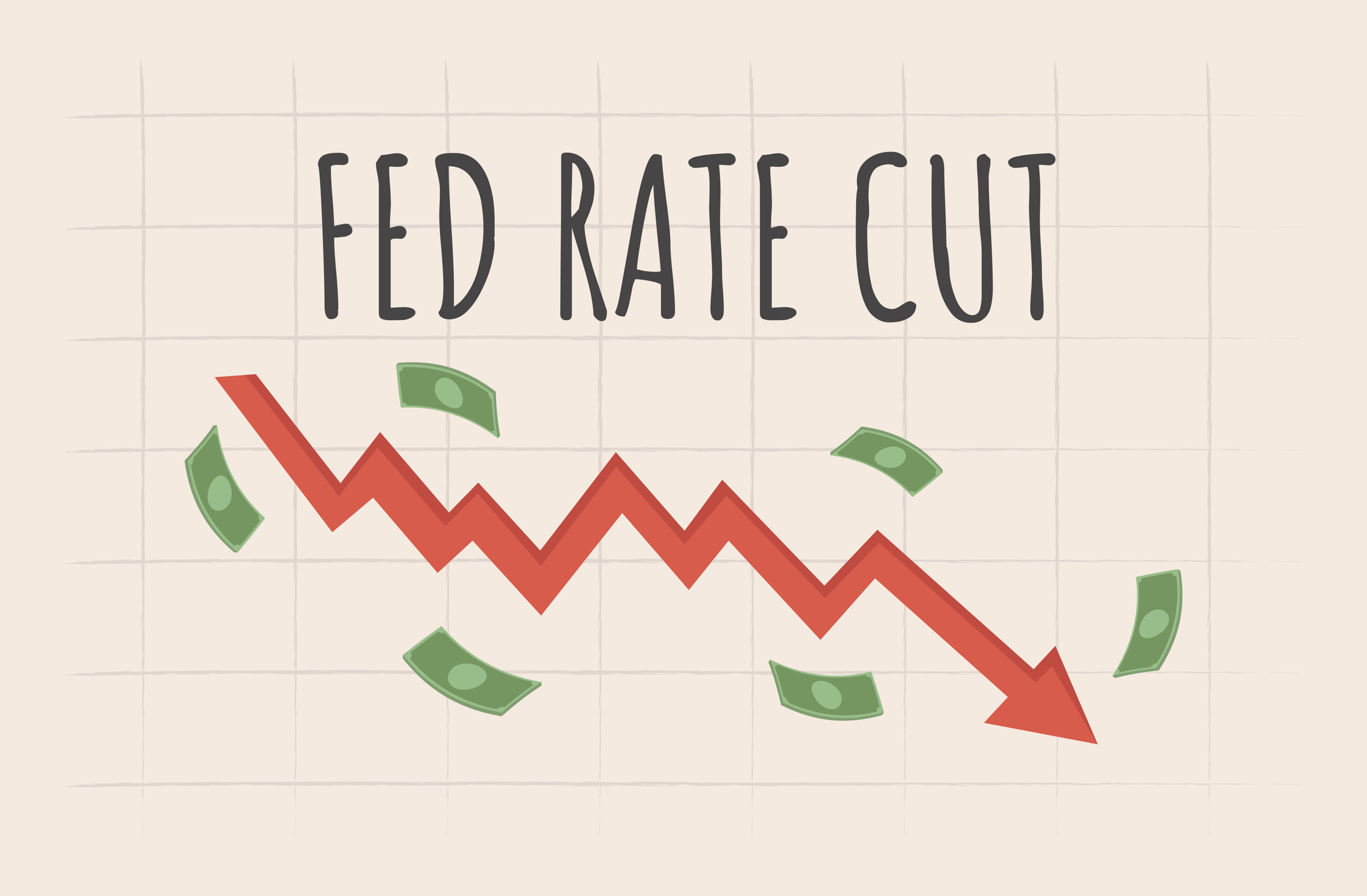Best Stocks to Buy for Fed Rate Cuts
The Federal Reserve cut rates again at its December meeting, and lower borrowing costs could boost these large-cap stocks.

Profit and prosper with the best of Kiplinger's advice on investing, taxes, retirement, personal finance and much more. Delivered daily. Enter your email in the box and click Sign Me Up.
You are now subscribed
Your newsletter sign-up was successful
Want to add more newsletters?

Delivered daily
Kiplinger Today
Profit and prosper with the best of Kiplinger's advice on investing, taxes, retirement, personal finance and much more delivered daily. Smart money moves start here.

Sent five days a week
Kiplinger A Step Ahead
Get practical help to make better financial decisions in your everyday life, from spending to savings on top deals.

Delivered daily
Kiplinger Closing Bell
Get today's biggest financial and investing headlines delivered to your inbox every day the U.S. stock market is open.

Sent twice a week
Kiplinger Adviser Intel
Financial pros across the country share best practices and fresh tactics to preserve and grow your wealth.

Delivered weekly
Kiplinger Tax Tips
Trim your federal and state tax bills with practical tax-planning and tax-cutting strategies.

Sent twice a week
Kiplinger Retirement Tips
Your twice-a-week guide to planning and enjoying a financially secure and richly rewarding retirement

Sent bimonthly.
Kiplinger Adviser Angle
Insights for advisers, wealth managers and other financial professionals.

Sent twice a week
Kiplinger Investing Weekly
Your twice-a-week roundup of promising stocks, funds, companies and industries you should consider, ones you should avoid, and why.

Sent weekly for six weeks
Kiplinger Invest for Retirement
Your step-by-step six-part series on how to invest for retirement, from devising a successful strategy to exactly which investments to choose.

The Federal Reserve started cutting interest rates in September and followed up with another quarter-point reduction at its October and December meetings. The current range for federal funds rate is now at 3.5% to 3.75%, its lowest level since September 2022. For investors seeking the best stocks to buy for Fed rate cuts, we have you covered.
There's a rather heavy-handed philosophy touted by some financial gurus that says debt is always a bad thing and should be avoided at all costs. But debt is simply a tool, and it can be good or bad depending on how you use it.
Consider that even cash-rich Apple (AAPL) holds about $100 billion in debt on its balance sheet – proof that some of the biggest and most successful companies on Wall Street see the benefit of judicious borrowing even if they have ready cash in the bank.
From just $107.88 $24.99 for Kiplinger Personal Finance
Become a smarter, better informed investor. Subscribe from just $107.88 $24.99, plus get up to 4 Special Issues

Sign up for Kiplinger’s Free Newsletters
Profit and prosper with the best of expert advice on investing, taxes, retirement, personal finance and more - straight to your e-mail.
Profit and prosper with the best of expert advice - straight to your e-mail.
That said, borrowing does come with a real cost via interest payments. And companies that have significant debt loads can often miss out on future opportunities if they are too busy paying down loans.
That's why lower interest rates can be beneficial to certain large-cap stocks. Indeed, capital-intensive businesses such as banks, real estate firms and telecoms regularly borrow money to pay for big projects, and even a modest reduction in rates can create lower costs for this select group.
With this in mind, the following list represents some of the best stocks to buy for Fed rate cuts thanks to the prospect of reduced borrowing costs in the months and years ahead.
AT&T

- Sector: Communication services
- Market value: $173.0 billion
- Total debt: $158.5 billion
AT&T (T) is one of the most established blue chip stocks on Wall Street and has been in operation since 1882.
And in 2025, amid broader market volatility, investors have increasingly favored stable, low-risk dividend-paying stocks such as this telecom giant.
The environment looks even more favorable given the prospect of lower interest rates. The company's current debt load is substantial, but it is actually down from about $170 billion in 2021 amid a major corporate restructuring and the 2022 spinoff of its WarnerMedia unit.
Easier access to capital will only accelerate this transition, keeping T stock a compelling choice for conservative investors seeking both income and stability.
It's also worth noting that lower borrowing costs mean more cash left over to support AT&T's juicy 4.5% dividend yield.
First Horizon

- Sector: Financials
- Market value: $11.8 billion
- Total debt: $5.6 billion
Mid-sized regional bank First Horizon (FHN) operates out of Memphis and boasts more than $80 billion in total assets.
This isn't quite the tally of trillion-dollar mega banks, but that's because the company focuses on commercial banking for small businesses, consumer checking accounts and other close-to-home financial operations.
And this makes FHN one of the best stocks to benefit from lower interest rates, as any rate cut is likely to boost demand for business loans, car loans and new mortgages.
FHN is already one of the better-performing financial stocks thanks to solid operations and a strong outlook. In the past 12 months, shares are up 16.9% on a total return basis (price change plus dividends) vs the S&P 500's roughly 14.5% gain.
Any reduction in rates will add momentum, given the natural lift to the day-to-day operations of this regional bank.
Ford Motor

- Sector: Consumer discretionary
- Market value: $53.4 billion
- Total debt: $161.7 billion
Ford Motor (F) has been stuck in a rut for about three years, its share price churning from $10 to $14 and back again as it's struggled for relevance in a changing automotive marketplace driven by electric vehicle (EV) adoption.
But the bigger concern for many investors isn't the automaker's product mix. Rather, it's the company's roughly $160 billion in debt, which gives Ford a debt-to-equity ratio of 3.469, one of the highest among its fellow large-cap stocks.
It should go without saying that lower interest rates will benefit a company with a debt load of this size, and perhaps will give the consumer discretionary stock the wiggle room it needs to streamline operations and rethink its positioning for the future.
And if lower rates spark a few more auto loans for consumers who want a new F-150, all the better.
NextEra Energy

- Sector: Utilities
- Market value: $169.2 billion
- Total debt: $93.2 billion
Utility stocks are among the most recession-proof investments given the built-in demand for electricity. As one of the largest publicly traded utilities in the U.S., NextEra Energy (NEE) offers unrivaled stability.
However, it's expensive to build out a network that serves some 6 million customer accounts, and lower interest rates will give NEE the access to capital that it needs to maintain and grow its operations.
The company is also a leader in renewable energy, generating more wind and solar power than any other U.S. utility.
Lower rates mean continued investment in clean energy infrastructure to ensure this utility is in the best position for long-term profitability and relevance in the age of climate change.
Prologis

- Sector: Real estate
- Market value: $120.5 billion
- Total debt: $35.9 billion
Anyone who has a mortgage knows how important interest rates are to property loans. And that dynamic holds true for homeowners, as well as real estate investment trusts, or REITs.
Prologis (PLD) is one of the largest REITs on Wall Street, with some 1.3 billion square feet of space across warehouses and industrial properties. Thanks to its massive scale and the high barrier to entry for competitors, it can provide reliable profits for shareholders.
But growth is getting harder to come by as land is in demand in key markets and construction costs remain high – meaning Prologis stands to benefit from a lower interest rate environment that will allow it to expand its already massive footprint.
And like many of the other dividend stocks on this list, the access to additional capital will make it easier for the company to support its 3.2% dividend yield to shareholders.
Related content
Profit and prosper with the best of Kiplinger's advice on investing, taxes, retirement, personal finance and much more. Delivered daily. Enter your email in the box and click Sign Me Up.

Jeff Reeves writes about equity markets and exchange-traded funds for Kiplinger. A veteran journalist with extensive capital markets experience, Jeff has written about Wall Street and investing since 2008. His work has appeared in numerous respected finance outlets, including CNBC, the Fox Business Network, the Wall Street Journal digital network, USA Today and CNN Money.
-
 Quiz: Do You Know How to Avoid the "Medigap Trap?"
Quiz: Do You Know How to Avoid the "Medigap Trap?"Quiz Test your basic knowledge of the "Medigap Trap" in our quick quiz.
-
 5 Top Tax-Efficient Mutual Funds for Smarter Investing
5 Top Tax-Efficient Mutual Funds for Smarter InvestingMutual funds are many things, but "tax-friendly" usually isn't one of them. These are the exceptions.
-
 AI Sparks Existential Crisis for Software Stocks
AI Sparks Existential Crisis for Software StocksThe Kiplinger Letter Fears that SaaS subscription software could be rendered obsolete by artificial intelligence make investors jittery.
-
 5 Top Tax-Efficient Mutual Funds for Smarter Investing
5 Top Tax-Efficient Mutual Funds for Smarter InvestingMutual funds are many things, but "tax-friendly" usually isn't one of them. These are the exceptions.
-
 Why Invest In Mutual Funds When ETFs Exist?
Why Invest In Mutual Funds When ETFs Exist?Exchange-traded funds are cheaper, more tax-efficient and more flexible. But don't put mutual funds out to pasture quite yet.
-
 Social Security Break-Even Math Is Helpful, But Don't Let It Dictate When You'll File
Social Security Break-Even Math Is Helpful, But Don't Let It Dictate When You'll FileYour Social Security break-even age tells you how long you'd need to live for delaying to pay off, but shouldn't be the sole basis for deciding when to claim.
-
 I'm an Opportunity Zone Pro: This Is How to Deliver Roth-Like Tax-Free Growth (Without Contribution Limits)
I'm an Opportunity Zone Pro: This Is How to Deliver Roth-Like Tax-Free Growth (Without Contribution Limits)Investors who combine Roth IRAs, the gold standard of tax-free savings, with qualified opportunity funds could enjoy decades of tax-free growth.
-
 One of the Most Powerful Wealth-Building Moves a Woman Can Make: A Midcareer Pivot
One of the Most Powerful Wealth-Building Moves a Woman Can Make: A Midcareer PivotIf it feels like you can't sustain what you're doing for the next 20 years, it's time for an honest look at what's draining you and what energizes you.
-
 Stocks Make More Big Up and Down Moves: Stock Market Today
Stocks Make More Big Up and Down Moves: Stock Market TodayThe impact of revolutionary technology has replaced world-changing trade policy as the major variable for markets, with mixed results for sectors and stocks.
-
 I'm a Wealth Adviser Obsessed With Mahjong: Here Are 8 Ways It Can Teach Us How to Manage Our Money
I'm a Wealth Adviser Obsessed With Mahjong: Here Are 8 Ways It Can Teach Us How to Manage Our MoneyThis increasingly popular Chinese game can teach us not only how to help manage our money but also how important it is to connect with other people.
-
 Looking for a Financial Book That Won't Put Your Young Adult to Sleep? This One Makes 'Cents'
Looking for a Financial Book That Won't Put Your Young Adult to Sleep? This One Makes 'Cents'"Wealth Your Way" by Cosmo DeStefano offers a highly accessible guide for young adults and their parents on building wealth through simple, consistent habits.